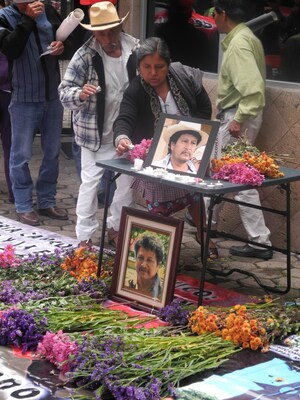OTTAWA, ON, April 5, 2023 /CNW/ – Today, corporate accountability experts sent a 30-page submission to the UN Human Rights Council ahead of its April 2023 Universal Periodic Review of Canada, denouncing Canada for its continued diplomatic support of mining companies over the safety of human rights and environment defenders (HRDs).
The submission draws on five well-documented case studies from Mexico, Guatemala, Peru, and Ecuador to illustrate key themes that define Canada’s diplomatic approach to mining conflicts abroad. Among the studies cited, in Mexico, the unconditional support of the Canadian Embassy for Blackfire Exploration is believed to have put the life of environment defender Mariano Abarca at greater risk in the months before his murder in November 2009. In Ecuador, in 2021, the Canadian Ambassador denied appeals for support from the president of the Shuar Arutam People, Josefina Tunki, after Tunki allegedly received death threats from the VP for Operations of Canadian company Solaris Resources as a result of her people’s opposition to the company’s copper project.
The submission, authored by the Justice and Corporate Accountability Project (JCAP) with support from MiningWatch Canada, is endorsed by 27 Canadian civil society organizations and 39 professors, lawyers, and legal scholars. The Universal Periodic Review Working Group of the UN Human Rights Council will review Canada’s compliance with its human rights commitments, and make specific recommendations with the onus on Canada to implement changes.
“We have found that Canadian embassies continue to provide significant support for Canadian mining companies despite being aware of serious and credible allegations of human and environmental rights violations,” says Charis Kamphuis, TRU law professor and JCAP board member. “The Universal Periodic Review is a crucial opportunity to shine the spotlight on Canada and reveal the massive gulf between Canada’s domestic and international human rights commitments, and the actions and omissions of Canadian officials who consistently ignore the concerns of affected communities and the risks to defenders. In some cases, Canadian officials have taken steps to undermine communities’ efforts to defend their rights and access justice.”
The submission explores ongoing problems with Canada’s Voices at Risk Guidelines on supporting human rights defenders, a set of guidelines that specify how Canadian embassies and other officials should support HRDs, including Canadian HRDs, and promote responsible conduct on the part of Canadian companies operating abroad. The submission identifies specific policy failures, including a lack of clarity regarding the concrete obligations of Canadian officials, lack of reporting and transparency on how the guidelines are implemented, and lack of independent oversight to ensure compliance.
“At the same time that Canadian embassy officials make considerable efforts to promote Canadian mining interests abroad putting defenders at greater risk, the Canadian government has failed to ensure even a modicum of accountability for those responsible for devastating harms,” says Viviana Herrera, Latin America Program Coordinator for MiningWatch Canada. “We’re asking the Working Group to make strong recommendations to Canada to finally square its actions with its commitments when it comes to state and corporate accountability.”
JCAP makes the following recommendations to the Working Group in its submission:
- Recommend that Canada reform its policy and legal approach to economic diplomacy and HRDs abroad to an approach that can ensure that the actions of Canadian officials comply with Canada’s international human and environmental rights obligations.
- Recommend that such reforms be developed only after a fulsome and meaningful process of civil society engagement. This should include HRDs, Indigenous peoples, communities, and groups who are directly affected by industrial resource extraction abroad, with the support of the Canadian government and diplomatic missions.
- Recommend that Canada conduct a comprehensive review of the failures of Canadian officials to uphold Canada’s international human and environmental rights obligations in the four case studies cited in this report. This review should identify the appropriate remedies owed to any individuals who were harmed directly or indirectly by Canada’s actions.
SOURCE Justice and Corporate Accountability Project (JCAP)




